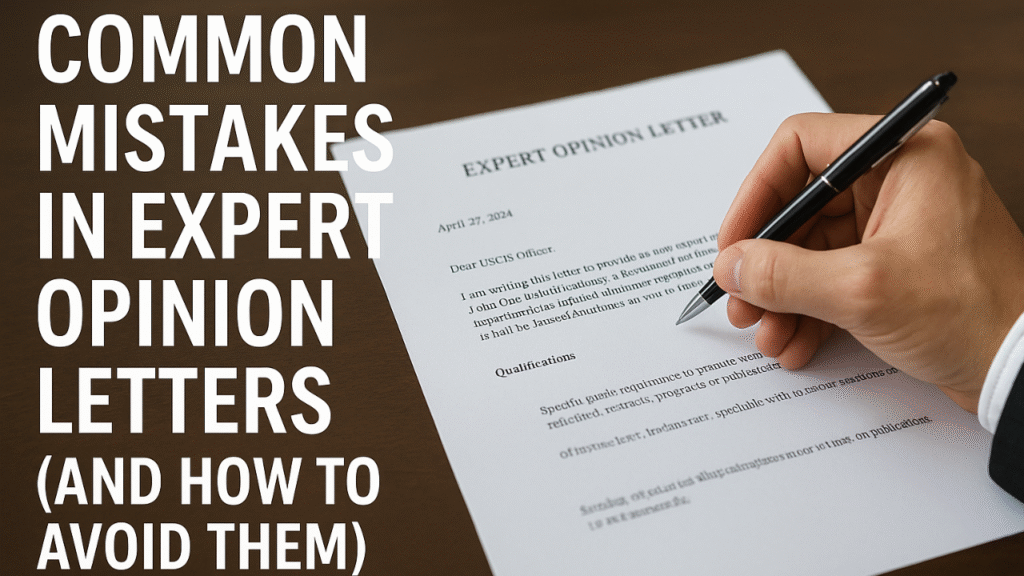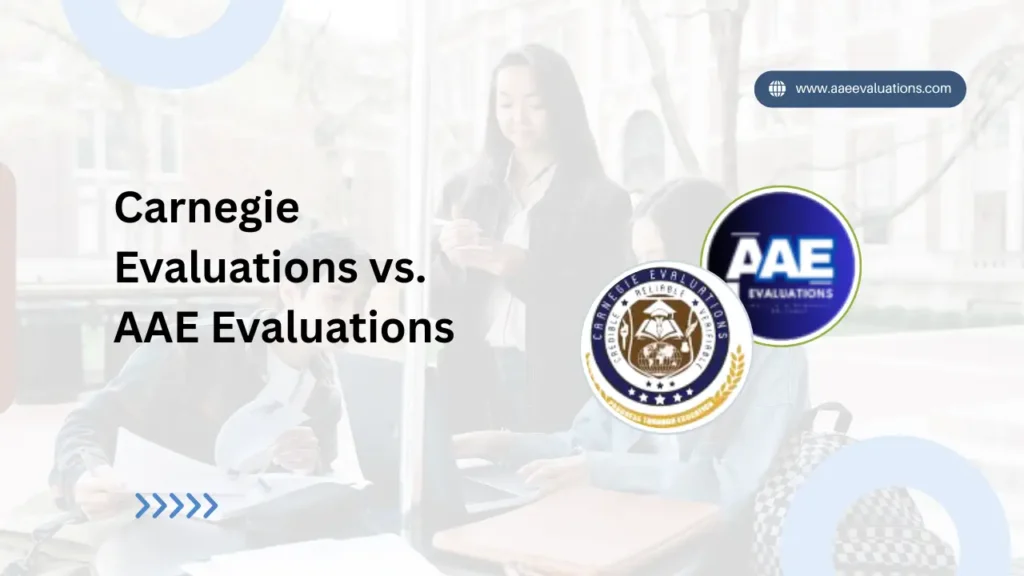Pro Tips to Perfect Your NIW Expert Opinion Letters for USCIS Approval
In the world of immigration, law, and professional documentation, expert opinion letters hold tremendous importance. They serve as formal attestations from recognized authorities in specific fields, confirming an individual’s expertise, experience, or qualifications. Whether it’s for a visa petition, academic evaluation, or a legal case, an expert opinion letter can significantly influence the decision-making process.
However, even small mistakes in these letters can lead to serious consequences such as application delays, rejections, or credibility concerns. Many applicants and even professionals fail to recognize how critical accuracy and structure are in an expert opinion letter. A poorly written or incomplete letter can overshadow the applicant’s strengths and reduce the overall impact of their submission.
In this comprehensive guide, we’ll explore the most common mistakes in expert opinion letters and provide clear strategies to avoid them. By understanding these pitfalls, applicants and writers can ensure their letters stand out for all the right reasons.
Understanding What an Expert Opinion Letter Is
An expert opinion letter is a formal document written by an individual recognized as an authority in a particular field. This person, often a professor, researcher, industry leader, or professional with significant credentials reviews and validates someone’s professional background, qualifications, or experience.
These letters are widely used in different contexts such as:
- Immigration Petitions: Especially for visa categories like H-1B, EB-2 NIW, and O-1, where applicants must demonstrate exceptional skills or specialized knowledge.
- Academic Evaluations: For credential equivalency, degree validation, or course recognition.
- Legal Cases: When an expert’s technical or professional opinion is required to support an argument.
- Patent or Trademark Disputes: Where a domain expert assesses innovation, originality, or prior art.
Because of their weight in influencing outcomes, these letters must be precise, well-researched, and credible. Even a small oversight can undermine the document’s legitimacy.
Common Mistakes in Expert Opinion Letters and How to Avoid Them
Below are some of the most frequent errors made in expert opinion letters, along with practical solutions to ensure your letter remains professional, persuasive, and compliant.
1. Choosing an Expert Without the Right Credentials
A common mistake occurs when the selected expert does not have sufficient authority or recognition in the relevant field. For example, if an applicant from the IT industry has their letter written by a professor of economics, it may not hold the required weight in immigration or academic evaluation processes.
Why It Matters:
Decision-makers rely heavily on the credibility of the expert. If the expert’s background doesn’t align with the applicant’s field, the letter’s value diminishes, no matter how well-written it is.
How to Avoid It:
- Always select an expert whose qualifications directly relate to your field.
- Verify that their experience, research, or professional record aligns with the subject being evaluated.
- Clearly mention the expert’s background, education, and current role in the letter to establish authority.
2. Using Generic or Template-Based Letters
Another major issue arises when writers use the same template for multiple letters without personalization. Generic language, repetitive statements, and lack of specific details make the letter look impersonal and insincere.
Why It Matters:
A letter that looks copy-pasted or robotic fails to reflect the expert’s genuine assessment. Decision-makers can easily identify template-based letters, and this reduces their impact.
How to Avoid It:
- Customize every expert opinion letter according to the applicant’s unique background.
- Mention specific projects, skills, and accomplishments to demonstrate authenticity.
- Ensure that the tone remains professional yet personal, showing that the expert has actually evaluated the case.
3. Lack of Supporting Evidence or Details
Many expert opinion letters make sweeping claims like “The applicant is a highly qualified engineer” without providing evidence. Unsupported statements appear vague and unconvincing.
Why It Matters:
Regulatory authorities and institutions value evidence-based assessments. Without concrete examples or measurable data, the letter loses persuasive power.
How to Avoid It:
- Back every claim with facts, figures, or achievements.
- Include metrics such as “led a team of 12 engineers,” “increased efficiency by 30%,” or “published 5 peer-reviewed papers.”
- Reference specific documents or experiences that support your evaluation.
4. Poor Formatting and Structure
A disorganized letter with inconsistent formatting, missing headers, or abrupt transitions can appear unprofessional even if the content is strong.
Why It Matters:
A structured document helps readers follow the argument smoothly. A poorly formatted one can confuse or frustrate evaluators.
How to Avoid It:
- Follow a clear format:
- Introduction of the expert
- Purpose of the letter
- Detailed evaluation of the applicant
- Conclusion and endorsement
- Use consistent spacing, alignment, and font styles.
- Include the expert’s letterhead if available.
5. Missing Key Details About the Applicant
A well-written expert opinion letter should include all relevant details about the applicant’s background, experience, and skills. Missing even basic information like job titles, employment dates, or academic degrees can make the letter incomplete.
Why It Matters:
Incomplete details raise doubts about accuracy and can cause delays or denials. Decision-makers expect full and verifiable information.
How to Avoid It:
- Include the applicant’s full name, job title, company name, employment period, and role details.
- Cross-check information with supporting documents.
- Provide context for achievements, showing how they align with the expert’s opinion.
6. Overuse of Weak or Exaggerated Language
Using overly flattering or weak statements can harm credibility. Phrases like “the applicant might be skilled” or “is the best in the world” either sound uncertain or unrealistic.
Why It Matters:
Decision-makers look for balanced, factual statements. Overly positive or ambiguous wording can seem biased or unprofessional.
How to Avoid It:
- Use confident and objective language such as “demonstrated advanced expertise in” or “consistently achieved outstanding results in.”
- Avoid both exaggeration and hesitation.
- Maintain a factual and formal tone throughout the letter.
7. Ignoring Agency or Institutional Guidelines
Different agencies, universities, or immigration departments have unique requirements for expert opinion letters. Failing to follow these guidelines can lead to rejection.
Why It Matters:
Ignoring official requirements indicates a lack of attention to detail. For example, the U.S. Citizenship and Immigration Services (USCIS) expects expert letters to include specific elements such as the expert’s credentials, independent assessment, and signature.
How to Avoid It:
- Review official requirements before writing.
- Include all necessary components such as the expert’s title, relationship with the applicant, and summary of evaluation.
- Seek professional review or legal consultation when needed.
8. Grammatical Errors and Unprofessional Writing Style
A letter full of spelling or grammatical errors immediately undermines its credibility. Even a qualified expert’s opinion can lose impact if the language is poor.
Why It Matters:
Professional tone and correct grammar are essential in legal and academic documents. Mistakes can make the expert appear careless or unqualified.
How to Avoid It:
- Proofread multiple times before submission.
- Use professional editing tools or hire a proofreader.
- Maintain a clear, formal, and precise writing style.
9. Missing Signature or Authentication Details
A surprisingly common mistake is forgetting to include the expert’s signature, title, or contact information. Without these details, the letter may be considered invalid.
Why It Matters:
Authenticity is everything in an expert opinion letter. Unsigned letters or those without verifiable details can be rejected outright.
How to Avoid It:
- Always include the expert’s full name, title, organization, email, and phone number.
- Sign the letter either digitally or physically.
- Use the official letterhead if available to enhance credibility.
10. Lack of Clear Structure and Flow
Even if all required details are present, a poorly organized letter can confuse readers. Jumping between topics or failing to connect points reduces clarity.
Why It Matters:
Clarity ensures that decision-makers understand the expert’s reasoning quickly and easily. Disorganized letters can lead to misinterpretation.
How to Avoid It:
- Follow a logical sequence: introduction, assessment, evidence, and conclusion.
- Use short, clear paragraphs with transitional phrases.
- Summarize key points at the end to reinforce the evaluation.
How to Write a Strong and Persuasive Expert Opinion Letter
A well-crafted expert opinion letter not only validates an individual’s qualifications but also strengthens their overall application. Here are some essential elements to include:
- Introduction of the Expert
Start by introducing who the expert is, their credentials, and why they are qualified to give an opinion. Mention relevant experience, academic degrees, and professional accomplishments. - Purpose of the Letter
Clearly state why the letter is being written. For example, “This letter is written to evaluate the qualifications of Mr. John Doe for an H-1B visa petition.” - Detailed Evaluation
Provide an in-depth review of the applicant’s qualifications, professional experience, and skills. Reference specific projects, contributions, or publications. - Evidence-Based Support
Include measurable results, case studies, or achievements to support the evaluation. - Conclusion
End with a clear statement endorsing the applicant’s qualifications. For example, “Based on my assessment, I confirm that Mr. Doe possesses specialized knowledge equivalent to a U.S. Master’s degree in Computer Science.” - Signature and Contact Details
Always sign the letter and include contact details for verification.
Professional Tips for a Flawless Expert Opinion Letter
- Use a formal tone and professional formatting.
- Keep the letter concise but detailed, usually between one and two pages.
- Avoid emotional or subjective statements.
- Ensure every fact can be verified with supporting documents.
- Review the letter for grammar, accuracy, and compliance with guidelines.
Why Avoiding These Mistakes Matters
Expert opinion letters can significantly impact applications in immigration, education, and legal fields. A single error can cause unnecessary delays or outright rejections. By avoiding these mistakes, you increase the chances of success and demonstrate professionalism and attention to detail.
A well-written expert opinion letter communicates credibility, strengthens the applicant’s case, and builds trust with evaluators. It shows that both the expert and the applicant take the process seriously and have invested effort in ensuring the highest level of accuracy and professionalism.
Why You Should Work with AAE Evaluations
Preparing an expert opinion letter involves more than simply writing—it requires research, accuracy, and regulatory compliance. That’s where AAE Evaluations excels.
AAE Evaluations is a trusted provider of professional expert opinion letters for immigration, academic, and legal purposes. Their team includes highly qualified industry experts, university professors, and professional evaluators with years of experience in preparing credible and compliant letters.
Here’s why AAE Evaluations stands out:
- Access to verified experts across technology, engineering, business, and science fields.
- Letters fully compliant with USCIS and institutional guidelines.
- Personalized evaluation for every applicant—no templates or generic formats.
- Thorough editing and quality checks to eliminate grammar or formatting errors.
- Fast and reliable delivery with professional support throughout the process.
Whether you’re applying for an H-1B, EB-2 NIW, O-1 visa, or an academic evaluation, AAE Evaluations ensures your expert opinion letter reflects your true qualifications and maximizes your approval chances.
Conclusion
Writing an expert opinion letter requires more than just professional expertise; it demands precision, structure, and attention to every detail. Common mistakes such as choosing the wrong expert, using generic content, or failing to include key information can significantly weaken the letter’s impact.
By understanding these pitfalls and following the best practices outlined above, you can craft expert opinion letters that are credible, persuasive, and compliant with professional standards. Whether you’re preparing a letter for an immigration petition, academic evaluation, or legal case, accuracy and clarity are your greatest strengths.
An expert opinion letter is not just a formal requirement; it is a reflection of the expert’s integrity and the applicant’s professional journey. When written thoughtfully and meticulously, it becomes a powerful document that opens doors to new opportunities.



